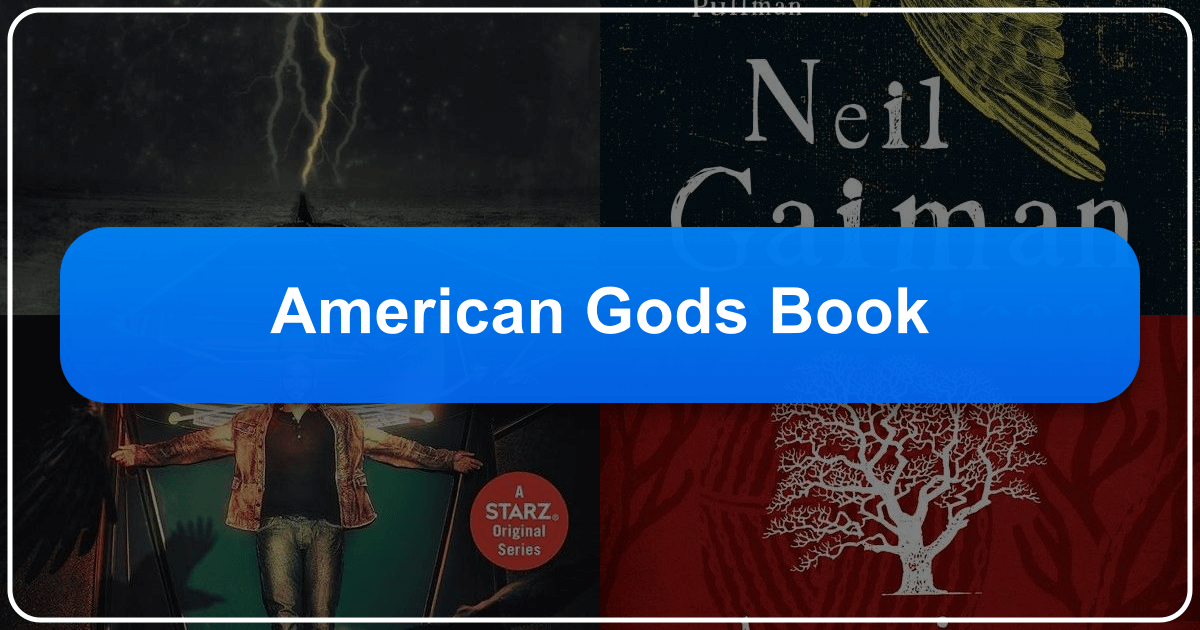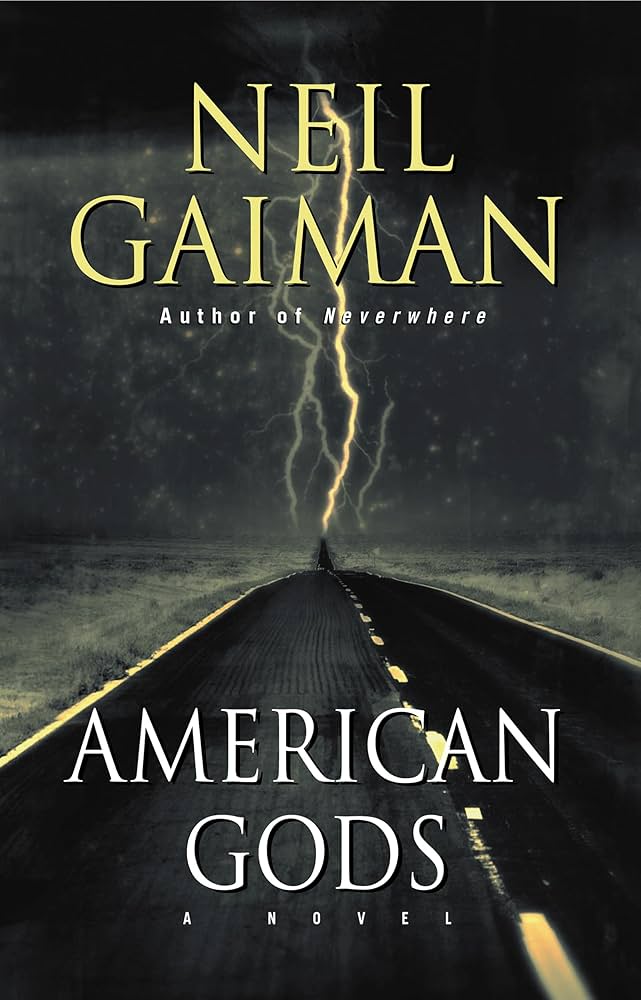American Gods: A Deep Dive into Neil Gaiman's Mythological Masterpiece

Neil Gaiman’s American Gods is more than just a fantasy novel; it’s a cultural phenomenon that has captivated readers and viewers alike since its publication in 2001. This exploration delves into the various aspects of the book, examining its genre, literary influence, adaptations, and enduring cultural impact, drawing upon the rich tapestry of themes and characters that make it a modern classic.
Genre and Literary Classification
American Gods defies easy categorization. While firmly rooted in the fantasy genre, its blend of mythology, magical realism, road trip narrative, and social commentary makes it a unique and multifaceted work. It draws heavily from various mythologies, seamlessly weaving together Norse, Egyptian, Native American, and other traditions, creating a vibrant and often unsettling tapestry of belief and faith. The novel is also a road trip story, following Shadow’s journey across America, which allows Gaiman to explore the diverse landscapes and cultures of the United States. Furthermore, the narrative incorporates elements of crime fiction, with Shadow’s involvement in criminal activities and the mystery surrounding Laura’s death, as well as elements of horror, evident in the dark and sometimes grotesque imagery and character portrayals. Finally, the novel’s underlying commentary on American culture, its history, and its evolving beliefs positions it within the realm of social commentary, making it a truly multi-genre experience. The novel seamlessly blends high fantasy with realistic depictions of American society, creating a world both fantastical and familiar.

The Mythology of American Gods
Central to the novel’s unique appeal is its innovative use of mythology. Gaiman doesn’t simply retell ancient myths; he reimagines them in a contemporary American context. The old gods, weakened by the decline of their worship, are forced to adapt and survive in a world dominated by the new gods of media, technology, and consumerism. This juxtaposition of the ancient and the modern offers a powerful commentary on the evolution of belief and faith in the modern age. The old gods are not idealized; many are flawed, even monstrous, reflecting the complexities of the human experience. The new gods, too, are compelling and often unsettling, representing the allure and dangers of technology and the commercialization of modern life.

Narrative Structure and Style
Gaiman’s writing style in American Gods is distinct and captivating. His prose is at times lyrical and poetic, evoking a sense of wonder and mystery, while at other times it is stark and realistic, grounded in the gritty realities of Shadow’s life and the American landscape. The narrative structure itself is non-linear, interweaving the main plot with interludes and flashbacks that provide context and depth to the story. These interludes often serve as self-contained short stories, enriching the overall narrative and highlighting Gaiman’s mastery of storytelling across different formats. The shifts in point of view, while sometimes criticized for disrupting the narrative flow, add another layer of complexity, allowing the reader to experience the story from multiple perspectives.

Authorial Influence and Inspiration
Neil Gaiman’s diverse literary influences are evident throughout American Gods. His background in comics, particularly his work on The Sandman, is reflected in the novel’s dark and fantastical elements, its blend of myth and modern life, and its complex, morally ambiguous characters. Gaiman himself has acknowledged the influence of authors such as Harlan Ellison, whose work on the themes of mythology and belief in Deathbird Stories foreshadowed the core concepts of American Gods. Similarly, the novel reflects Gaiman’s deep engagement with mythology and folklore from around the world, drawing inspiration from a wide range of cultures and traditions.
Neil Gaiman’s Writing Style
Gaiman’s writing is often described as lyrical, poetic, and evocative. His ability to seamlessly blend the fantastical with the mundane, to create characters that are both believable and larger-than-life, and his talent for crafting intricate, multi-layered narratives have all contributed to his immense popularity. In American Gods, his style is further characterized by its ability to shift between high fantasy sequences and down-to-earth realism, mirroring the novel’s central theme of the conflict between ancient gods and modern society.
Reading Habits and Interpretations
American Gods rewards multiple readings. Its rich detail, complex characters, and nuanced themes ensure that each encounter offers new insights and perspectives. The novel’s blend of genres and its intricate structure necessitate active engagement from the reader, prompting reflection on the book’s various layers of meaning. Some readers may prefer audiobooks for the full cast experience, which lends itself to the book’s diverse cast of characters and world-building; others may find the extensive narrative better appreciated in print, allowing them to easily revisit and ponder complex passages.
Educational and Cultural Value
Beyond its entertainment value, American Gods offers significant educational and cultural merit. Its exploration of diverse mythologies provides readers with exposure to a wide range of belief systems and cultural traditions. The novel’s commentary on American culture, its history, and its struggles with identity serves as a compelling lens for understanding the nation’s multifaceted nature and its complexities. The intertwining of historical events with fantastical elements makes the book’s exploration of American history both engaging and thought-provoking.
Life Lessons and Themes
At its heart, American Gods is a story about belief, faith, and the power of stories. It explores the enduring human need for meaning and purpose, how these needs shape our lives and our culture, and how our beliefs, both personal and collective, can shape our destinies. The novel’s exploration of mythology serves as a powerful metaphor for the way in which we create and maintain our own belief systems and identities. It also raises important questions about the nature of good and evil, the relationship between gods and mortals, and the enduring power of myth and legend in the modern world. The novel’s characters, both human and divine, grapple with complex moral dilemmas, further enriching the book’s exploration of ethical complexities.
Impact on Libraries and Archives
American Gods has found a prominent place in numerous libraries and archives, reflecting its literary significance and its position within contemporary literature. Its presence in public libraries facilitates accessibility for a wider readership. In digital libraries, it offers an accessible format for those who prefer electronic reading, allowing access to a broader demographic. The novel’s impact extends to rare book collections and archives, where it may be preserved as a significant work of contemporary fantasy literature. Its impact on library and archive collections illustrates its literary significance and its lasting influence.
Cultural Impact and Reception
American Gods has received widespread critical acclaim, winning numerous awards, including the Hugo Award and the Nebula Award. Its success has spawned a television adaptation, further expanding its reach and influence on popular culture. The book’s themes of mythology, faith, and cultural identity have sparked a multitude of discussions and interpretations. The novel’s influence has extended to other literary works, inspiring authors to engage with similar themes and exploring the interplay between mythology and contemporary culture. The novel’s popularity and its influence on television and other media demonstrate its considerable cultural impact.
Adaptations and Literary Influence
The Starz television adaptation of American Gods, while not without its departures from the source material, introduced the novel to a much broader audience and played a significant role in popularizing its themes. The show’s success served to further solidify the novel’s status as a modern classic. The novel’s innovative use of mythology and its exploration of American culture have also directly inspired other writers, prompting further exploration of similar themes and contributing to the evolution of fantasy literature as a whole.
Awards and Recognition
The numerous awards American Gods has received, including the Hugo and Nebula Awards, further underscore its literary merit and its impact on the fantasy genre. These awards have not only validated Gaiman’s work but have also drawn greater attention to the novel, contributing to its widespread popularity and solidifying its place within the literary canon. The awards and recognition demonstrate the book’s literary excellence and its sustained influence on readers and the literary community.
In conclusion, American Gods is a rich and complex work that transcends simple genre classifications. It is a multi-layered exploration of mythology, belief, and the American experience, which continues to resonate with readers and influence writers to this day. Its enduring popularity and its impact on popular culture highlight its status as a significant literary achievement of the 21st century.